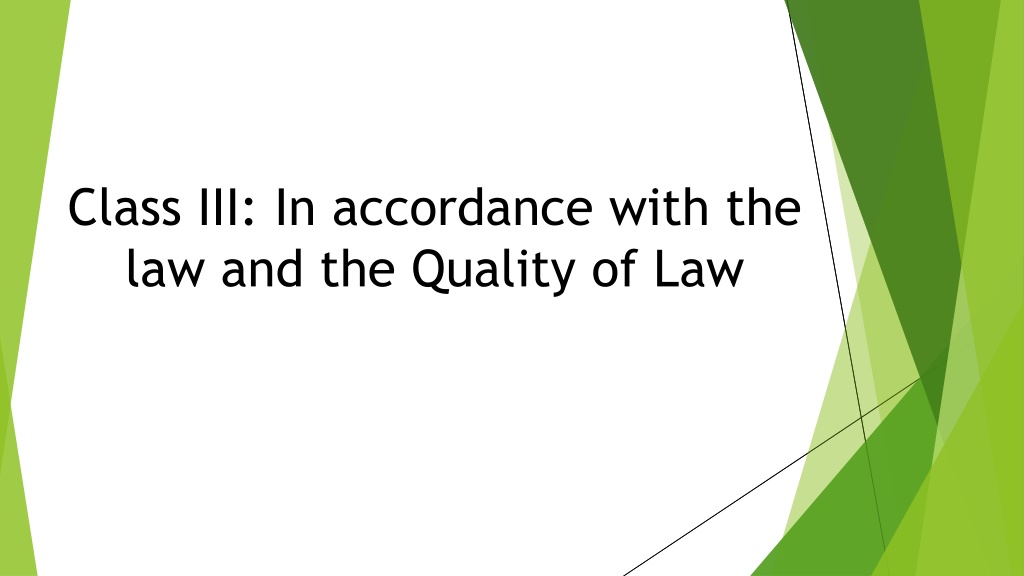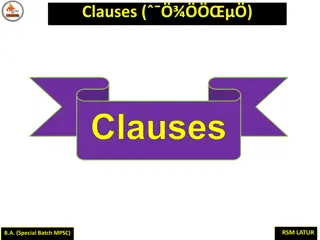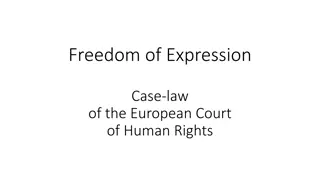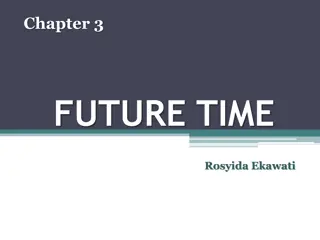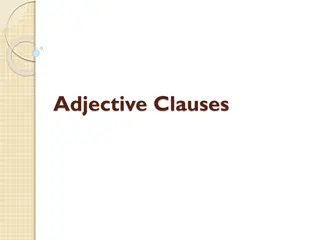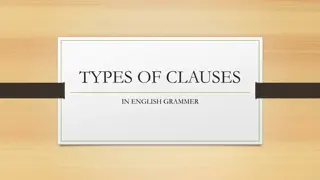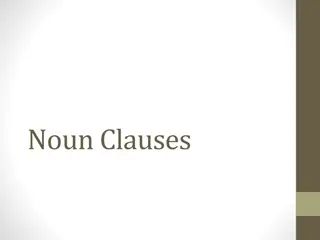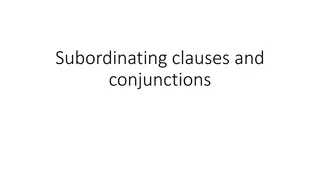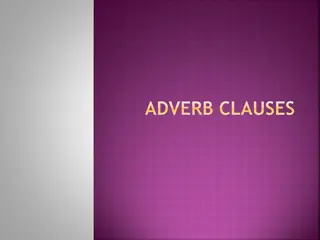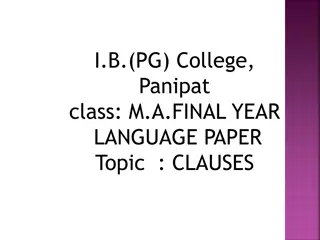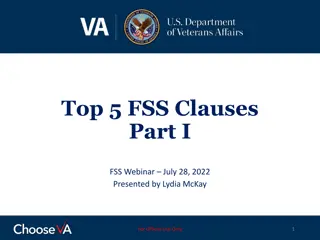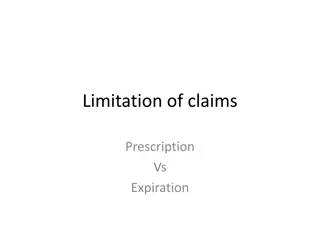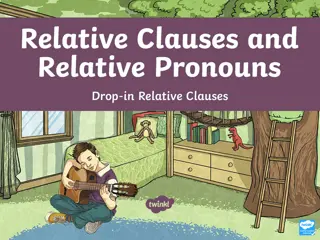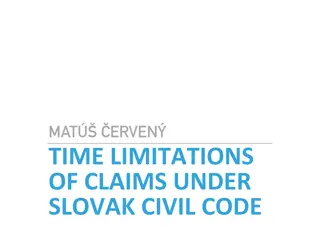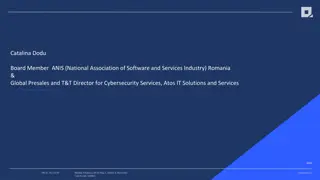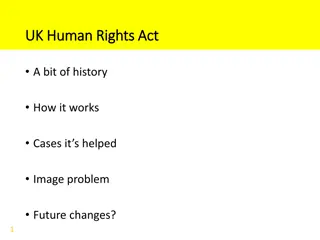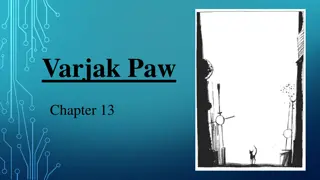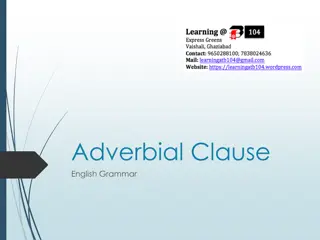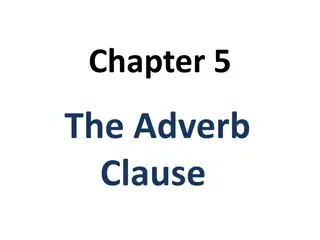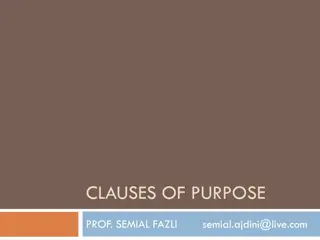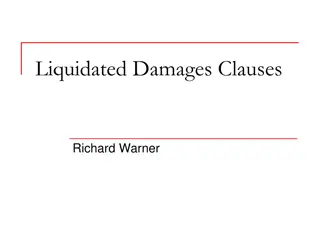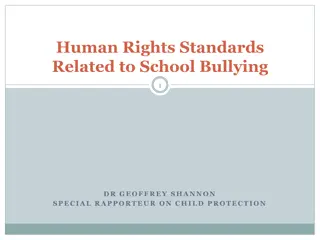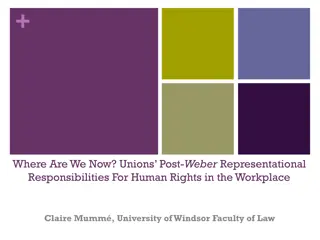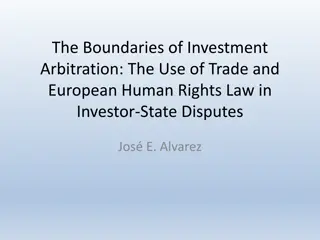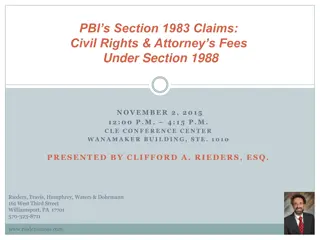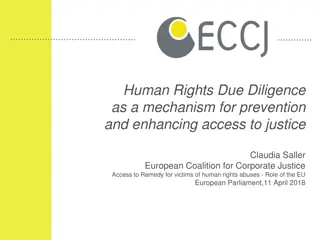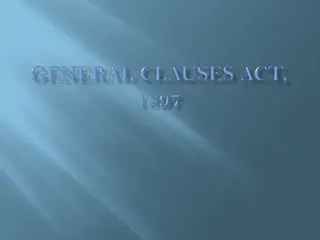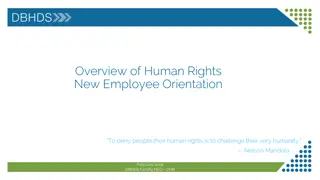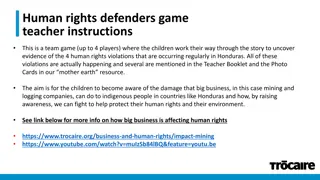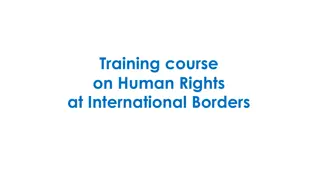Ensuring Compliance with Limitation Clauses in Accordance with European Human Rights Law
Exploring the essence of limitation clauses in the European Convention on Human Rights, focusing on Articles 8 to 11 regarding privacy, freedom of thought, expression, and assembly. Understanding the balance between individual rights and societal interests as outlined in the law.
Download Presentation

Please find below an Image/Link to download the presentation.
The content on the website is provided AS IS for your information and personal use only. It may not be sold, licensed, or shared on other websites without obtaining consent from the author. Download presentation by click this link. If you encounter any issues during the download, it is possible that the publisher has removed the file from their server.
E N D
Presentation Transcript
Class III: In accordance with the law and the Quality of Law
Overview (1) Limitation clauses ECHR (2) Traveaux preparatoires (3) Dominant interpretation ECtHR (4) Early exceptions: quality of law (5) Minimum requirements of law (6) Constitutional Court
(1) Limitation clauses ECHR ARTICLE 8 Right to respect for private and family life 1. Everyone has the right to respect for his private and family life, his home and his correspondence. 2. There shall be no interference by a public authority with the exercise of this right except such as is in accordance with the law and is necessary in a democratic society in the interests of national security, public safety or the economic well-being of the country, for the prevention of disorder or crime, for the protection of health or morals, or for the protection of the rights and freedoms of others.
(1) Limitation clauses ECHR ARTICLE 9 Freedom of thought, conscience and religion 1. Everyone has the right to freedom of thought, conscience and religion; this right includes freedom to change his religion or belief and freedom, either alone or in community with others and in public or private, to manifest his religion or belief, in worship, teaching, practice and observance. 2. Freedom to manifest one s religion or beliefs shall be subject only to such limitations as are prescribed by law and are necessary in a democratic society in the interests of public safety, for the protection of public order, health or morals, or for the protection of the rights and freedoms of others.
(1) Limitation clauses ECHR ARTICLE 10 Freedom of expression 1. Everyone has the right to freedom of expression. This right shall include freedom to hold opinions and to receive and impart information and ideas without interference by public authority and regardless of frontiers. This Article shall not prevent States from requiring the licensing of broadcasting, television or cinema enterprises. 2. The exercise of these freedoms, since it carries with it duties and responsibilities, may be subject to such formalities, conditions, restrictions or penalties as are prescribed by law and are necessary in a democratic society, in the interests of national security, territorial integrity or public safety, for the prevention of disorder or crime, for the protection of health or morals, for the protection of the reputation or rights of others, for preventing the disclosure of information received in confidence, or for maintaining the authority and impartiality of the judiciary.
(1) Limitation clauses ECHR ARTICLE 11 Freedom of assembly and association 1. Everyone has the right to freedom of peaceful assembly and to freedom of association with others, including the right to form and to join trade unions for the protection of his interests. 2. No restrictions shall be placed on the exercise of these rights other than such as are prescribed by law and are necessary in a democratic society in the interests of national security or public safety, for the prevention of disorder or crime, for the protection of health or morals or for the protection of the rights and freedoms of others. This Article shall not prevent the imposition of lawful restrictions on the exercise of these rights by members of the armed forces, of the police or of the administration of the State.
(1) Limitation clauses ECHR ARTICLE 12 Right to marry Men and women of marriageable age have the right to marry and to found a family, according to the national laws governing the exercise of this right.
(1) Limitation clauses ECHR ARTICLE 2 Right to life 1. Everyone s right to life shall be protected by law. No one shall be deprived of his life intentionally save in the execution of a sentence of a court following his conviction of a crime for which this penalty is provided by law. 2. Deprivation of life shall not be regarded as inflicted in contravention of this Article when it results from the use of force which is no more than absolutely necessary: (a) in defence of any person from unlawful violence; (b) in order to effect a lawful arrest or to prevent the escape of a person lawfully detained; (c) in action lawfully taken for the purpose of quelling a riot or insurrection.
(1) Limitation clauses ECHR ARTICLE 4 Prohibition of slavery and forced labour 1. No one shall be held in slavery or servitude. 2. No one shall be required to perform forced or compulsory labour. 3. For the purpose of this Article the term forced or compulsory labour shall not include: (a) any work required to be done in the ordinary course of detention imposed according to the provisions of Article 5 of this Convention or during conditional release from such detention; (b) any service of a military character or, in case of conscientious objectors in countries where they are recognised, service exacted instead of compulsory military service; (c) any service exacted in case of an emergency or calamity threatening the life or well-being of the community; (d) any work or service which forms part of normal civic obligations.
(1) Limitation clauses ECHR ARTICLE 5 Right to liberty and security 1. Everyone has the right to liberty and security of person. No one shall be deprived of his liberty save in the following cases and in accordance with a procedure prescribed by law: (a) the lawful detention of a person after conviction by a competent court; (b) the lawful arrest or detention of a person for non-compliance with the lawful order of a court or in order to secure the fulfilment of any obligation prescribed by law; (c) the lawful arrest or detention of a person effected for the purpose of bringing him before the competent legal authority on reasonable suspicion of having committed an offence or when it is reasonably considered necessary to prevent his committing an offence or fleeing after having done so; (d) the detention of a minor by lawful order for the purpose of educational supervision or his lawful detention for the purpose of bringing him before the competent legal authority; (e) the lawful detention of persons for the prevention of the spreading of infectious diseases, of persons of unsound mind, alcoholics or drug addicts or vagrants; (f) the lawful arrest or detention of a person to prevent his effecting an unauthorised entry into the country or of a person against whom action is being taken with a view to deportation or extradition.
(1) Limitation clauses ECHR 2. Everyone who is arrested shall be informed promptly, in a language which he understands, of the reasons for his arrest and of any charge against him. 3. Everyone arrested or detained in accordance with the provisions of paragraph 1 (c) of this Article shall be brought promptly before a judge or other officer authorised by law to exercise judicial power and shall be entitled to trial within a reasonable time or to release pending trial. Release may be conditioned by guarantees to appear for trial. 4. Everyone who is deprived of his liberty by arrest or detention shall be entitled to take proceedings by which the lawfulness of his detention shall be decided speedily by a court and his release ordered if the detention is not lawful. 5. Everyone who has been the victim of arrest or detention in contravention of the provisions of this Article shall have an enforceable right to compensation.
(1) Limitation clauses ECHR ARTICLE 6 Right to a fair trial 1. In the determination of his civil rights and obligations or of any criminal charge against him, everyone is entitled to a fair and public hearing within a reasonable time by an independent and impartial tribunal established by law. Judgment shall be pronounced publicly but the press and public may be excluded from all or part of the trial in the interests of morals, public order or national security in a democratic society, where the interests of juveniles or the protection of the private life of the parties so require, or to the extent strictly necessary in the opinion of the court in special circumstances where publicity would prejudice the interests of justice. 2. Everyone charged with a criminal offence shall be presumed innocent until proved guilty according to law. 3. Everyone charged with a criminal offence has the following minimum rights:
(1) Limitation clauses ECHR (a) to be informed promptly, in a language which he understands and in detail, of the nature and cause of the accusation against him; (b) to have adequate time and facilities for the preparation of his defence; (c) to defend himself in person or through legal assistance of his own choosing or, if he has not sufficient means to pay for legal assistance, to be given it free when the interests of justice so require; (d) to examine or have examined witnesses against him and to obtain the attendance and examination of witnesses on his behalf under the same conditions as witnesses against him; (e) to have the free assistance of an interpreter if he cannot understand or speak the language used in court.
(1) Limitation clauses ECHR ARTICLE 7 No punishment without law 1. No one shall be held guilty of any criminal offence on account of any act or omission which did not constitute a criminal offence under national or international law at the time when it was committed. Nor shall a heavier penalty be imposed than the one that was applicable at the time the criminal offence was committed. 2. This Article shall not prejudice the trial and punishment of any person for any act or omission which, at the time when it was committed, was criminal according to the general principles of law recognised by civilised nations.
(1) Limitation clauses ECHR ARTICLE 12 Right to marry Men and women of marriageable age have the right to marry and to found a family, according to the national laws governing the exercise of this right.
(1) Limitation clauses ECHR ARTICLE 14 Prohibition of discrimination The enjoyment of the rights and freedoms set forth in this Convention shall be secured without discrimination on any ground such as sex, race, colour, language, religion, political or other opinion, national or social origin, association with a national minority, property, birth or other status.
(1) Limitation clauses ECHR ARTICLE 3 Prohibition of torture No one shall be subjected to torture or to inhuman or degrading treatment or punishment.
(1) Limitation clauses ECHR ARTICLE 13 Right to an effective remedy Everyone whose rights and freedoms as set forth in this Convention are violated shall have an effective remedy before a national authority notwithstanding that the violation has been committed by persons acting in an official capacity.
(1) Limitation clauses ECHR ARTICLE 15 Derogation in time of emergency 1. In time of war or other public emergency threatening the life of the nation any High Contracting Party may take measures derogating from its obligations under this Convention to the extent strictly required by the exigencies of the situation, provided that such measures are not inconsistent with its other obligations under international law. 2. No derogation from Article 2, except in respect of deaths resulting from lawful acts of war, or from Articles 3, 4 (paragraph 1) and 7 shall be made under this provision. 3. Any High Contracting Party availing itself of this right of derogation shall keep the Secretary General of the Council of Europe fully informed of the measures which it has taken and the reasons therefor. It shall also inform the Secretary General of the Council of Europe when such measures have ceased to operate and the provisions of the Convention are again being fully executed.
(1) Limitation clauses ECHR ARTICLE 17 Prohibition of abuse of rights Nothing in this Convention may be interpreted as implying for any State, group or person any right to engage in any activity or perform any act aimed at the destruction of any of the rights and freedoms set forth herein or at their limitation to a greater extent than is provided for in the Convention. ARTICLE 18 Limitation on use of restrictions on rights The restrictions permitted under this Convention to the said rights and freedoms shall not be applied for any purpose other than those for which they have been prescribed.
(2) Traveaux preparatoires Interpration method Grammatical interpretation Historical interpretation Systematic interpretation Teleological interpretation Development Choices By whom?
(2) Traveaux preparatoires Precise definition of enumeration method: Art. 6. In the exercise of these rights, and in the enjoyment of the freedoms guaranteed by the Convention, no lirnitations shall be imposed except those established by the law, with the sole object of ensuring the recognition and respect for the rights and freedorns of others, or with the purpose of satisfying the just requirements of public morality, order and security in a democratie society Rule of law and democracy: One group stressed that the ultimate power in constitutional democracies was with the legislative branch, while the other group underlined that even the democratic legislator was bound by constitutional principles and the rule of law. Although neither group was glaringly victorious, it is clear that idea that the democratic legislator should not be scrutinised by the European Court of Human Rights eventually took the upper hand
(2) Traveaux preparatoires Art. 7. The object of this collective guarantee shall be to ensure that the laws of each state in which are ern bodied the guaranteed rights and freecloms as well as the application of these laws are in accordance with "the general principles of law as recognised by civilisecl nations" and referred to in Article 38c of the Statute of the International Court of Justice. Rejected; reference in Article 7 ECHR and preamble instead: Being resolved, as the governments of European countries which are like-minded and have a common heritage of political traditions, ideals, freedom and the rule of law, to take the first steps for the collective enforcement of certain of the rights stated in the Universal Declaration .
(2) Traveaux preparatoires To provide another example, a proposal was made to annex a special Convention to the ECHR, to law down principles of the rule of law. In my opinion, what we must fear to- day is not the seizure of power by totalitarianism by means of violence, but rather that totalitarianism will attempt to put itself in power by pseudo-legitimate means. [] For example, the Italian constitution was never repealed, all constitutional principles remained in theory, but the special laws approved by the Chambers, elected in one misdirected campaign, robbed the constitution little by little of all its substance, especially of its substance of freedom. The battle against totalitarianism should rather be modified and should become a battle against abuse of legislative power, rather than abuse of executive power. It was suggested that the ECtHR should have the power to hold any law contrary to the ECHR unconstitutional ipso jure. That proposal, however, was also rejected as well. Traveaux Pr paratoires, Vol II, p. 136-138. Traveaux Pr paratoires Vol II, p. 140.
(2) Traveaux preparatoires It seems to suggest that the only form of reparation will be compensation. It seems to suggest that the European Court will be able to grant indemnities to victims, damages and interest, or reparation of this kind. It does not say that the European Court will be able to pronounce the nullity or invalidity of the rule, or the law, or the decree which constitutes a violation of the Convention. That, Ladies and Gentlemen, is something very grave. True, reparation in kind may be advisable where the victim is a specified individual. In case of an action ultra vires of this sort on the part of the local police, a mayor, a prefect, or even a minister, satisfaction may be given in the form of reparation in cash or the awarding of an indemnity. But can the graver form of violation which consists in removing a fundamental law guaranteeing a specific freedom for the whole nation, from the laws of a country in virtue of some law or decree, can such a violation be redressed by awarding a symbolic farthing darn ages to the citizens of the country? If, tomorrow, France were to sink into a dictatorship, and if her dictator were to suppress the freedom of the Press, would the European Court award a franc damages to all Frenchmen so as to compensate for the injury which the suppression of this fundamental freedom had caused them? Such a proceeding would not make sense. If we really want an European Court to succeed in guaranteeing the rights which we have placed under its protection, we must grant jurisdiction to declare void, if need be, the laws and decrees which violate the Convention. Traveaux Pr paratoires, Vol V, p. 300-302.
(3) Dominant interpretation ECtHR No in abstracto claims Case-by-case basis Often relatively short judgements: The Court notes that the envelope in which the applicant's first letter of 21 May 2003 was sent to the Court from the Che m Prison bears two stamps that read: censored and the Che m District Court . [] The Court observes that, according to Article 214 of the Code of Execution of Criminal Sentences, persons detained on remand should enjoy the same rights as those convicted by a final judgment. Accordingly, the prohibition of censorship of correspondence with the European Court of Human Rights contained in Article 103 of the same Code, which expressly relates to convicted persons, was also applicable to detained persons. Thus, censorship of the applicant's two letters to the Court was contrary to the domestic law. It follows that the interference in the present case was not in accordance with the law . ECtHR, Lewak v. Poland, application no. 21890/03, 06 September 2007.
(3) Dominant interpretation ECtHR What are the restrictions for the executive power? There should be a law The law should have democratic legitimacy The executive power should use the powers for the purposes specified in the law The executive power should stay within the limmits specified in the law: time, location, person, etc. The executive power should fulfill the conditions for using the power specified in the law: e.g. get a warrent The executive power is not allowed to circumvent these restrictions by hiring a private sector body
(3) Dominant interpretation ECtHR How about the judicial power? How about positive obligations?
(3) Dominant interpretation ECtHR Only judgment on the individual case of the complainant Compensation often nil or minimal
(4) Early exceptions: quality of law Sunday Times (1979), the applicants argued, inter alia, that the law of contempt of court was so vague and uncertain and the principles enunciated in a decision at national level so novel that the restraint imposed on them could not be regarded as "prescribed by law". The Court stressed that the word "law" in the expression "prescribed by law" covered not only statute but also unwritten law, including established doctrines in common law. It recognised the slightly different formulations used throughout the Convention, such as "in accordance with the law" (Art. 8 ECHR) and "provided for by law" (Arts. 9-11 ECHR), and stressed that two requirements followed from the latter formulation (but not from the formulation used in Art. 8 ECHR). Firstly, the law must be adequately accessible: the citizen must be able to have an indication that is adequate in the circumstances of the legal rules applicable to a given case. Secondly, a norm cannot be regarded as a "law" unless it is formulated with sufficient precision to enable the citizen to regulate his conduct: he must be able - if need be with appropriate advice - to foresee, to a degree that is reasonable in the circumstances, the consequences which a given action may entail. Those consequences need not be foreseeable with absolute certainty: experience shows this to be unattainable. Again, whilst certainty is highly desirable, it may bring in its train excessive rigidity and the law must be able to keep pace with changing circumstances. ECtHR, Sunday Times v. the United Kingdom, application no. 6538/74, 26 April 1979, 49.
(4) Early exceptions: quality of law More about legislation and regulations as such, which must be foreseeable and accessible, not so much about the question whether the executive has complied with the conditions set by the law. The Court quickly declared this doctrine applicable to Article 8 ECHR as well. ECtHR, Silver and others v. the United Kingdom, application nos. 5947/72, 6205/73, 7052/75, 7061/75, 7107/75, 7113/75 and 7136/75, 25 March 1983, 85.
(4) Early exceptions: quality of law ECtHR, Malone v. the United Kingdom, application no. 8691/79, 02 august 1984 Since the implementation in practice of measures of secret surveillance of communications is not open to scrutiny by the individuals concerned or the public at large, it would be contrary to the rule of law for the legal discretion granted to the executive to be expressed in terms of an unfettered power. Consequently, the law must indicate the scope of any such discretion conferred on the competent authorities and the manner of its exercise with sufficient clarity, having regard to the legitimate aim of the measure in question, to give the individual adequate protection against arbitrary interference. ECtHR, Leander v. Sweden, application no. 9248/81, 26 March 1987. In Leander (1987), this line of interpretation was confirmed when the Court stressed that, while laws can normally be more open, because policies and actions by governmental organisations are generally disclosed to the public, where the implementation of the law consists of secret measures, not open to scrutiny by the individuals concerned or by the public at large, the law itself, as opposed to the accompanying administrative practice, must indicate the scope of any discretion conferred on the competent authority with sufficient clarity, having regard to the legitimate aim of the measure in question, to give the individual adequate protection against arbitrary interference.
(4) Early exceptions: quality of law The case of Malone had a significant impact on the principles of accessibility and foreseeability. Although the Court still points to the importance of legal certain for citizens, its main concern is not so much with abuse of power by the executive branch (using powers beyond the boundaries set by the legislator) but with arbitrary use of power (where the executive stays within those boundaries, but the problem is that the boundaries are very broad or non-existent). In addition, an important alteration is that the principle of foreseeability is interpreted not so much as requiring that citizens should be able to know which actions are or are not prohibited (as secret surveillance by police units or intelligence agencies are generally introduced to uncover terrorist cells, organised crimes, etc., about which there is generally no doubt whether they are prohibited or not) but with the foreseeability of how the executive branch would use its powers, when and to whom. Consequently, while the original formulation of the notions of accessibility and foreseeability concerned the relationship between the legislative branch and citizens, this interpretation of the principles focusses primarily on the relationship between the legislative branch and the executive branch, as the legislative power must set clear boundaries for the use of power the executive must respect.
(4) Early exceptions: quality of law Gradually, the quality of law principe has been applied in a variety of cases under Article 8 ECHR. ECtHR, Olsson v. Sweden, application no. 10465/83, 24 March 1988. ECtHR, Kruslin v. France, application no. 11801/85, 24 April 1990. ECtHR, Huvig v. France, application no. 11105/84, 24 April 1990. ECtHR, Kopp v. Switzerland, application no. 23224/94, 25 March 1998. ECtHR, Amann v. Switzerland, application no. 27798/95, 16 February 2000. ECtHR, Weber and Saravia v. Germany, application no. 54934/00, 29 June 2006, 94-95. See also: ECtHR, Association for European Integration and Human Rights and Ekimdzhiev v. Bulgaria, application no. 62540/00, 28 June 2007. ECtHR, Liberty and others v. the United Kingdom, application no. 58243/00, 01 July 2008.
(4) Early exceptions: quality of law Step by step, more reqruiements have been attached tot this doctrine: Unclarity with respect to the categories of people liable to have their telephones tapped; - Unclarity with respect to the nature of the offences which may give rise to such an order; - Absence of a limit on the duration of telephone tapping; - No procedure for drawing up the summary reports containing intercepted conversations; - Unclarity on the point of the precautions to be taken in order to communicate the recordings for possible inspection by the judge and the defence; - Unclarity about the circumstances in which recordings may or must be erased. -
(5) Minimum requirements of law ECtHR, Roman Zakharov v. Russia, application no. 47143/06, 04 December 2015. ECtHR, Centrum f r R ttvisa v. Sweden, application no. 35252/08, 19 June 2018. ECtHR, Big Brother Watch and others v. the United Kingdom, application nos. 58170/13, 62322/14 and 24960/15, 13 September 2018. In abstracto cases
References to how prudently (or not) powers are used in practice References to another minimum requirement of law 1. Accessibility of the domestic law the Court did not find it necessary to pursue further the issue of the accessibility of the domestic law. It will concentrate instead on the requirements of foreseeability and necessity . Zakharov This is a question that goes to the foreseeability and necessity of the relevant law, rather than its accessibility. Big Brother Watch
References to how prudently (or not) powers are used in practice References to another minimum requirement of law 2. Scope of application of the secret surveillance measures 2.1 The nature of the offences which may give rise to an interception order; Although the Russian law leaves the authorities an almost unlimited degree of discretion in determining which events or acts constitute such a threat and whether that threat is serious enough to justify secret surveillance, thereby creating possibilities for abuse , the Court did not find a violation on this point. Instead, it referred to the fact that prior judicial authorisation for interceptions is required in Russia. Such judicial authorisation may serve to limit the law-enforcement authorities discretion []. Zakharov Bulk interception is by definition untargeted, and to require reasonable suspicion would render the operation of such a scheme impossible. Similarly, the requirement of subsequent notification assumes the existence of clearly defined surveillance targets, which is simply not the case in a bulk interception regime. Judicial authorisation, by contrast, is not inherently incompatible with the effective functioning of bulk interception. While the Court has recognised that judicial authorisation is an important safeguard against arbitrariness , to date it has not considered it to be a necessary requirement or the exclusion of judicial control to be outside the limits of what may be deemed necessary in a democratic society . (Big Brother Watch) 2.2 A definition of the categories of people liable to be subject to surveillance measures. while anyone could potentially have their communications intercepted under the section 8(4) regime, it is clear that the intelligence services are neither intercepting everyone s communications, nor exercising an unfettered discretion to intercept whatever communications they wish. Big Brother Watch
References to how prudently (or not) powers are used in practice References to another minimum requirement of law 3. The duration of secret surveillance measures 3.1 The period after which an interception warrant will expire; 3.2 The conditions under which a warrant can be renewed; 3.3 The circumstances in which it must be cancelled. the duty on the Secretary of State to cancel warrants which were no longer necessary meant, in practice, that the intelligence services had to keep their warrants under continuous review. Big Brother Watch notwithstanding that the relevant legislation is less clear with regard to the third safeguard, it must be borne in mind that any permit is valid for a maximum of six months and that a renewal requires a review as to whether the conditions are still met. Centrum f r R ttvisa
References to how prudently (or not) powers are used in practice References to another minimum requirement of law 4. The procedures for processing data 4.1 Storing; Although the FRA may maintain databases for raw material containing personal data up to one year, it has to be kept in mind that raw material is unprocessed information. That is, it has yet to be subjected to manual treatment. The Court accepts that it is necessary for the FRA to store raw material before it can be manually processed. Centrum f r R ttvisa IPT can examine whether the time-limits for retention have been complied with and, if they have not, it may find that there has been a breach of Article 8 of the Convention and order the destruction of the relevant material. Big Brother Watch while the specific retention periods are not in the public domain, it is clear that they cannot exceed two years and, in practice, they do not exceed one year (with much content and related communications data being retained for significantly shorter periods). Big Brother Watch 4.2 Accessing; 4.3 Examining; 4.4 Using; 4.5 Destroying.
References to how prudently (or not) powers are used in practice References to another minimum requirement of law 5. Authorisation procedures 5.1 The authority competent to authorise the surveillance; It is true that the Court has generally required a non-judicial authority to be sufficiently independent of the executive. However, it must principally have regard to the actual operation of a system of interception as a whole, including the checks and balances on the exercise of power, and the existence (or absence) of any evidence of actual abuse, such as the authorising of secret surveillance measures haphazardly, irregularly or without due and proper consideration. In the present case there is no evidence to suggest that the Secretary of State was authorising warrants without due and proper consideration. Big Brother Watch In practice, courts never requested the interception agency to submit additional materials and that a mere reference to the existence of information about a criminal offence or activities endangering national, military, economic or ecological security is considered to be sufficient for the authorisation to be granted. Zakharov 5.2 Its scope of review; while the privacy protection representative cannot appeal against a decision by the Foreign Intelligence Court or report any perceived irregularities to the supervisory bodies, the presence of the representative at the court s examinations compensates, to a limited degree, for the lack of transparency concerning the court s proceedings and decisions. Centrum f r R ttvisa examine with particular attention whether the supervision arrangements provided by Russian law are capable of ensuring that all interceptions are performed lawfully on the basis of proper judicial authorisation. Zakharov 5.3 The content of the interception authorisation.
References to how prudently (or not) powers are used in practice References to another minimum requirement of law 6. Ex post supervision of the implementation of secret surveillance measures 6.1 Independence; The ECtHR noted that the public prosecutor could hardly be said to be an independent supervisory authority, but still it did not find a violation on that specific point. Zakharov 6.2 Competence. it is for the Government to illustrate the practical effectiveness of the supervision arrangements with appropriate examples. Zakharov while there is no evidence to suggest that the intelligence services are abusing their powers on the contrary, the Interception of Communications Commissioner observed that the selection procedure was carefully and conscientiously undertaken by analysts , the Court is not persuaded that the safeguards governing the selection of bearers for interception and the selection of intercepted material for examination are sufficiently robust to provide adequate guarantees against abuse. Big Brother Watch
References to how prudently (or not) powers are used in practice References to another minimum requirement of law 7. Conditions for communicating data to and receiving data from other parties 7.1 Communicating; Although in the Court s view, the mentioned lack of specification in the provisions regulating the communication of personal data to other states and international organisations gives some cause for concern with respect to the possible abuse of the rights of individuals. On the whole, however, the Court considered that the supervisory elements described below sufficiently counterbalance these regulatory shortcomings. Centrum f r R ttvisa 7.2 Receiving. As the Government, at the hearing, informed the Court that it was implausible and rare for intercept material to be obtained unsolicited , the Court will restrict its examination to material falling into the second and third categories. Big Brother Watch no request for intercept material has ever been made in the absence of an existing RIPA warrant. Big Brother Watch
References to how prudently (or not) powers are used in practice References to another minimum requirement of law 8. Notification of interception of communications Court was clearly unsympathetic to this approach, it did not find a violation on this point, stressing that it would bear the absence of notification and the lack of an effective possibility of requesting and obtaining information, when assessing the effectiveness of remedies available under Russian law. Zakharov Taking into account that the requirement to notify the subject of secret surveillance measures is not applicable to the applicant and is, in any event, devoid of practical significance, like in Zakharov, the Court underlined that its findings on the point of the notification would be taken into account when evaluating the last minimum requirement of law: the available remedies. Centrum f r R ttvisa
References to how prudently (or not) powers are used in practice References to another minimum requirement of law 9. Available remedies In the Court s view, the aggregate of remedies, although not providing a full and public response to the objections raised by a complainant, must be considered sufficient in the present context, which involves an abstract challenge to the signals intelligence regime itself and does not concern a complaint against a particular intelligence measure. In reaching this conclusion, the Court attaches importance to the earlier stages of supervision of the regime, including the detailed judicial examination by the Foreign Intelligence Court of the FRA s requests for permits to conduct signals intelligence and the extensive and partly public supervision by several bodies, in particular the Foreign Intelligence Inspectorate. Centrum f r R ttvisa
(6) Constitutional Court? Exhaustion of domestic remedies Not effective Question of whether they are effective tied to legal question at hand Justified subjective belief of ineffectiveness Pilot judgement European Constitutional Court? As Judge Pinto de Albuquerque explained in his partly concurring, partly dissenting opinion in Villanianatos and others (2013), when the ECtHR assesses laws in abstracto, it does an abstract review of the conventionality of a Greek law, while acting as a court of first instance. The Grand Chamber not only reviews the Convention compliance of a law which has not been applied to the applicants, but furthermore does it without the benefit of prior scrutiny of that same legislation by the national courts. In other words, the Grand Chamber invests itself with the power to examine in abstracto the Convention compliance of laws without any prior national judicial review. ECtHR, Matelly v. France, application no. 10609/10, 02 November 2014.
